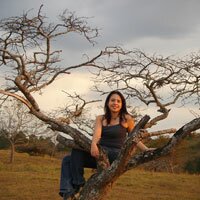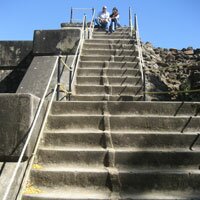

|
|||||||||
| Monday | Tuesday | Wednesday | Thursday | Friday | Saturday | Sunday | |||
| 1 | 2 | 3 | |||||||
| 4 | 5 | 6 | 7 | 8 | 9 | 10 | |||
| 11 | 12 | 13 | 14 | 15 | 16 | 17 | |||
| 18 | 19 | 20 | 21 | 22 | 23 | 24 | |||
| 25 | 26 | 27 | 28 | 29 | 30 | 31 | |||
Holidays and Feasts
New Year´s Day (January 1)
This is a day to meet and celebrate with the family, or a day to spend at the beach after a previous night of celebrating all night the end of the year.
Holy Week (varies)
Is very much celebrated throughout the country since Catholic Romans are predominant. Salvadorans celebrate Holy Week before Resurrection Sunday or Easter Sunday. Processions are held everywhere in the country with images of Jesus carrying the cross. Daily religious services are carried out. A place of interest is Sonsonate, El Salvador”s fourth most important city, well known for its street carpets made of colorful flowers and colored sawdust that are created on the street of the procession. This Holy Week tradition attracts visitors from all over the country.
Lent is kept by not consuming meat on Fridays but seafood instead during this time. Some of the most popular food for Holy Week is: fish cake soup or seafood soup, rice with clams accompanied with hot tortillas made from corn flour, plantain or mango marmalade, dry fruit candy and French toast with sugar cane honey (panela) called torrejas.
To end the week, Easter Sunday is celebrated with a special mass and a procession.
Labor Day (May 1)
Government and public enterprise close their offices for International Labor Day. Trade unions make a parade commemorating that day.
Soldiers´ Day (May 7)
Armed Forces” Day is a celebration for the Armed Forces with parades of the Armed Forces members. They commemorate with Air Force demonstrations followed by a ceremony and celebrations in each military base. All relatives and friends are invited to celebrate together with them.
Patron´s Saint Festivities (August 6)
Festivities of the Patron Saint, the Savior of the World (El Salvador del Mundo) are also called August Feasts (Fiestas Agostinas) are the country”s most important festivities. Religious, recreational and trade activities are carried out that usually last a whole week. The principal attraction is the traditional “Bajada” (descent) or procession of the Patron Saint, the Savior of the Word, that parades the principal streets of downtown San Salvador, representing the Transfiguration of Jesus Christ.
Independence Day (September 15)
National Independence Day is celebrated at national level at public and private schools, as well as military bases. Each city organizes parades with the students” participation that march representing their respective school with their bands and group of cheerleaders. Each group bears the flag of El Salvador and their school flag. Special ceremonies are also held at the square “Plaza Libertad” located in downtown San Salvador with the participation of the President of the El Salvador accompanied by his cabinet members to address the nation a related message.
Columbus Day (October 12)
Government and private offices are closed for Columbus Day. Everyone stays home resting or go out to have fun
Day of the Dead (November 2)
The Day of the Dead is a celebration in the entire country. It is customary to go to the cemetery and pray and place flowers on the tombs of the deceased loved ones. One can place wreaths of natural or paper flowers. It is also traditional to place cypress leaves wreaths for their pleasant aroma. The food usually consumed during this time of year is: tamales (chicken or pork, sweet or salty) and sliced pumpkin cooked with brown sugar. This dessert is called “Ayote en miel”.
First Cry of Independence (November 5)
The First Cry of Independence is a historical celebration that dates back 176 years when Presbyter José Matías Delgado declared El Salvador an independent nation after the signing of the Act of Independence on September 15, 1821.
Christmas celebration (December 24)
Christmas in El Salvador is celebrated with a family gathering at a traditional dinner to commemorate the birth of baby Jesus. Dinner is generally served after the entire family attends Mass (Misa del Gallo) on Christmas eve, which is celebrated in all churches exactly at midnight. Upon returning from church, the fabulous dinner consisting generally of oven roasted turkey, chicken or hen is served together with rice, potato salad, and fresh salad. Usual drinks are: beer, rum, wines or sodas, known as gaseosas. Fruit juices are commonly served to kids and of course the typical Horchata (mix of pulverized milk, cocoa beans and pumpkin seeds) can never fail.
Children celebrate Christmas with firecrackers and fireworks while they wait for Santa Claus´ arrival with toys.
The majority of Catholics decorate their homes with a Christmas tree garlanded with brilliant colorful decorations (green, red, yellow, golden, silver, etc.) and a Nativity scene that consists of a miniature representation of the Nativity when Jesus Christ was born. This Nativity scene includes vegetation, colored sawdust and art. The centerpiece of the Nativity scene is the figurines of Joseph, the Virgin Mary and baby Jesus.
New Year´s Eve (December 31)
New Year”s Eve is the happiest day for everyone. The end of the year is celebrated with a party where all friends are invited.
Holidays
January 1st New Year
Varies – Holy Week
May 1st – International Labor Day
August 1-7 Patron Saint – the Savior of the World (El Salvador del Mundo)
September 15 – National Independence
October 12 – Columbus Day
November 2 – The Day of the Dead
November 5 – First Cry of Independence
December 24 – Christmas Eve
December 25 – Christmas Day
December 31 – New Year”s Eve
Holidays celebrated but not observed
May 3 – Day of the Cross
May 7 – Armed Forces´ Day
May 10 – Mother´s Day
June 17 – Father´s Day
June 22 – Teacher´s Day
November 28 – San Miguel Carnival
Traditional Feasts
Almost every town in El Salvador celebrates a traditional feast in honor of its Patron Saint. These religious feasts are also a time for trading and for the organization of fairs that many people from the rest of the country attend. Detailed below are the most popular of these traditional feasts:
“La Bajada” (The Descent)
On August 6th we celebrate one of the most important feasts in honor of El Salvador”s Patron Saint, the “World”s Savior”. We call it “la Bajada” because it is on this day that agricultural workers (campesinos) from the San Salvador volcano and neighboring towns come down to venerate the Patron Saint and participate in the procession through the principal streets of the capital city.
“Day of the Cross”
The Day of the Cross is celebrated on May 3rd. It is common belief that this celebration was done by the Indians in honor of the God of Rain. This celebration that had the purpose of imploring the heavens for the benefit of the rain was materialized by the Spaniards who introduced the adoration of the Cross instead of the God of Rain. Each family decorated their Cross with fresh flores, tropical fruits and other ornaments made out of paper, the members of the family and visitors come in front of the cross and make the sign of the cross and pray to have the rigth to get a fruit, that act is called “adorar la cruz”.
The Feast of the Indians
The Feast of the Indians is celebrated on December 12th when the Virgin of Guadalupe, Patron Saint of Latin America, is venerated. On this day, young and children dress up with Indian costumes and accompany the Virgin during the procession. It commemorates the apparition of the Virgin to the Indian Juan Diego on the hills of Tepeyac in Mexico.
The mission of CEA is to increase awareness of Salvadoran Culture & History within our local & international community. CEA will accomplish the awareness by providing Cultural & Educational services in our communities, both local and international.The mission cooperates with best writing services, which allows to diversify the raising of awareness about the culture and history of El Salvador precisely through education.